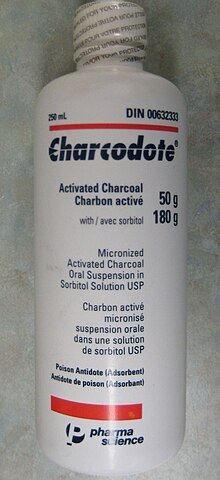Activated charcoal (medication)

Activated charcoal for medical use
|
|
| Clinical data | |
|---|---|
| Trade names | CharcoAid, others |
| AHFS/Drugs.com | Monograph |
| Routes of administration |
by mouth, nasogastric tube |
| Identifiers | |
| CAS Number | |
| ChemSpider |
|
| ECHA InfoCard |
100.036.697 |
Activated charcoal, also known as activated carbon, is a medication used to treat poisonings that occurred by mouth. To be effective it must be used within a short time of the poisoning occurring, typically an hour. It does not work for poisonings by cyanide, corrosive agents, iron, lithium, alcohols, or malathion. It may be taken by mouth or given by a nasogastric tube. Other uses include inside hemoperfusion machines.
Common side effects include vomiting, black stools, diarrhea, and constipation. The more serious side effect, pneumonitis, may result if aspirated into the lungs. Use in pregnancy and breastfeeding is safe. Activated charcoal works by adsorbing the toxin.
While charcoal has been used since ancient times for poisonings, activated charcoal has been used since the 1900s. It is on the World Health Organization's List of Essential Medicines, the most effective and safe medicines needed in a health system. The wholesale costs in the developing world is between 0.46 and 0.86 USD per dose. In the United States a course of treatment costs less than 25 USD.
Activated charcoal is used to treat many types of oral poisonings such as phenobarbital and carbamazepine. It is not effective for a number of poisonings including: strong acids or bases, iron, lithium, arsenic, methanol, ethanol or ethylene glycol.
...
Wikipedia
